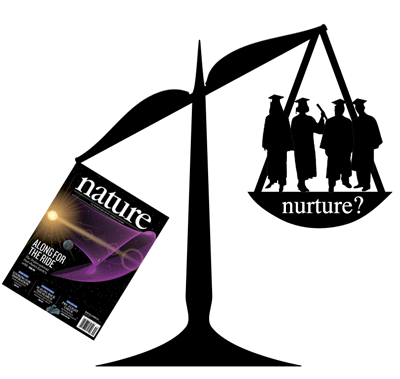There is a strong movement towards alternative metrics for assessing research and researchers. The San Francisco Declaration on Research Assessment is a terrific and eloquent argument in favor of judging the quality of the article rather than the impact factor of the journal where it is published. Both of the key products from our company – PubChase and Protocols – aim at undermining the impact factor by facilitating discovery and sharing of research knowledge, with no regard for the journal impact factor. However, when it comes to assessing academic researchers for hiring, funding, job promotion, and tenure, the alternative metrics movement does not go far enough. Whether it is journal or article-based assessment, we are assessing and rewarding the wrong metric.
In science, students and postdocs typically refer to professors as one of three: PI (principle investigator), mentor, or advisor. Strikingly, when assessing faculty, universities and funding agencies pay attention to the PI=research aspect only. Whether you are the best or the worst mentor in this world is virtually irrelevant for the tenure decision.
This is a travesty. We do not look for mentoring ability when we hire. We do not teach how to mentor. And we do not reward good mentoring in any way.
We already wrote about the fact that no one trains professors how to mentor. This is why we launched our Career Advice forum. As we wrote in January,
Academic faculty appointments at universities do not select for teaching or managing ability. We look for talented scientists, not mentors or teachers. And as with teaching, there is a natural distribution – some mentors are gems, most are mediocre, and some are nightmares.
If you are a group leader at Merck or Novartis, you will be trained on how to manage people and be a boss. Alas, no such mandatory training exists for professors. The tragedy of this is that a researcher at Merck, even if the boss is a disaster, can switch to Sanofi, Genentech, and so on (this researcher already has a PhD and likely has worked in the industry for many years). But a graduate student or postdoc is in a delicate relationship where a switch from an abusive mentor is far from easy. Advisors hold a power over their lab members that can be devastating when misapplied.
Obviously, making mentoring a part of the assessment equation is not trivial. How does one measure “good advising”? How can we suddenly base promotions on assessment of mentoring if we do not hire with any regard to it, do not teach how to advise, and do not incentivize it in any way?
Rewarding and measuring mentoring is hard. However, ignoring it entirely as we do now is costly and absurd. The lifetime contribution of any professor to the society, on any single topic of study, is dwarfed by the contribution of the scientists the professor trains. Moreover, from the perspective of the PI, there is often a tradeoff between using students and postdocs to get an article into Nature versus nurturing and mentoring these scientists.
How much should we weigh mentoring versus research output? Maybe 80% based on advising and 20% on research. Maybe it should be 50-50. Whatever the right number is, excluding mentoring entirely from the assessment of faculty is damaging our society, impeding science, and ruining lives.

The problem is somewhat understated. No one cares about your teaching ability, either. I have my list of anecdotes about how teaching weighs into hiring/tenure decisions, but so does everyone else. I’d like to think academic institutions will eventually pay a price for devaluing education, but, like global warming, it seems we’ll do the grand experiment first and worry about the consequences later.
That is right. Universities are supposed to be teaching/training institutions that also do research. Perversely, neither teaching nor mentoring are part of the hiring/promoting/funding equation. Good teaching and mentoring are also highly correlated. Were we to hire good researchers who are also good teachers, we would automatically end up with better mentors.
The problem is that current decision makers think they are flying when, in fact, they are in free fall. Only when disaster becomes unavoidable will they realize their error. Of course, by then it will be too late and we will have lost an entire generation of the highest quality scientists.
Just came across this.
“Toxic academic mentors” http://tenureshewrote.wordpress.com/2013/08/12/toxic-academic-mentors/